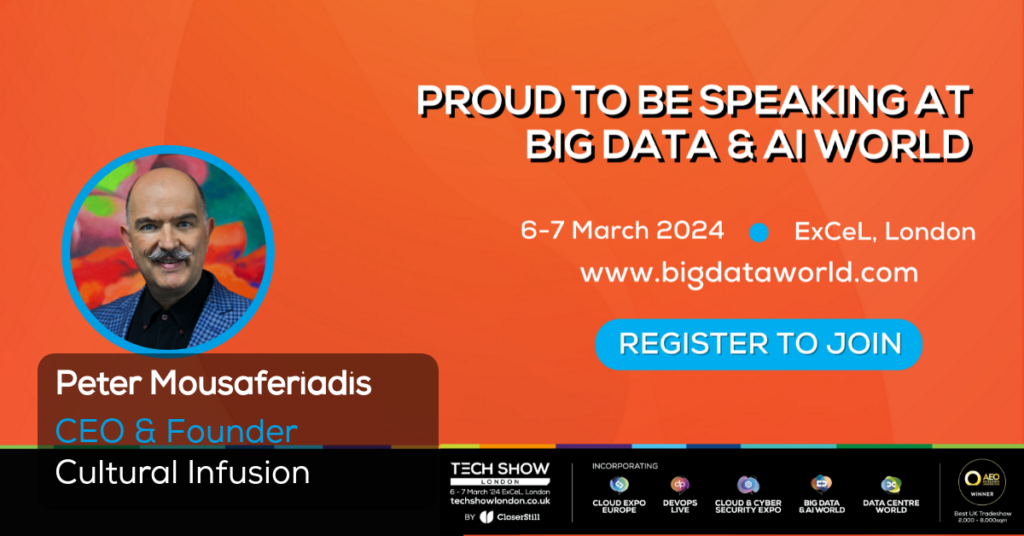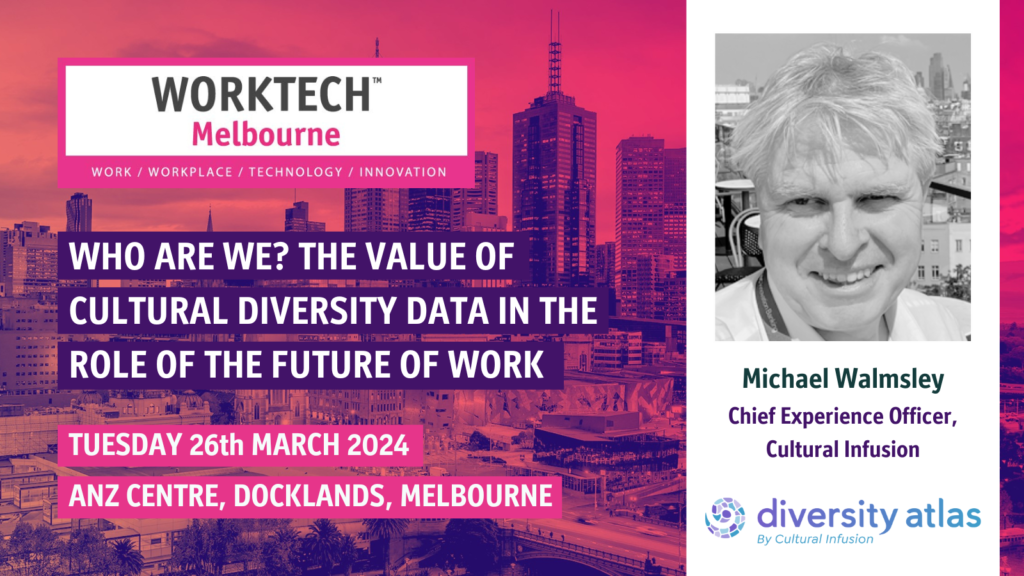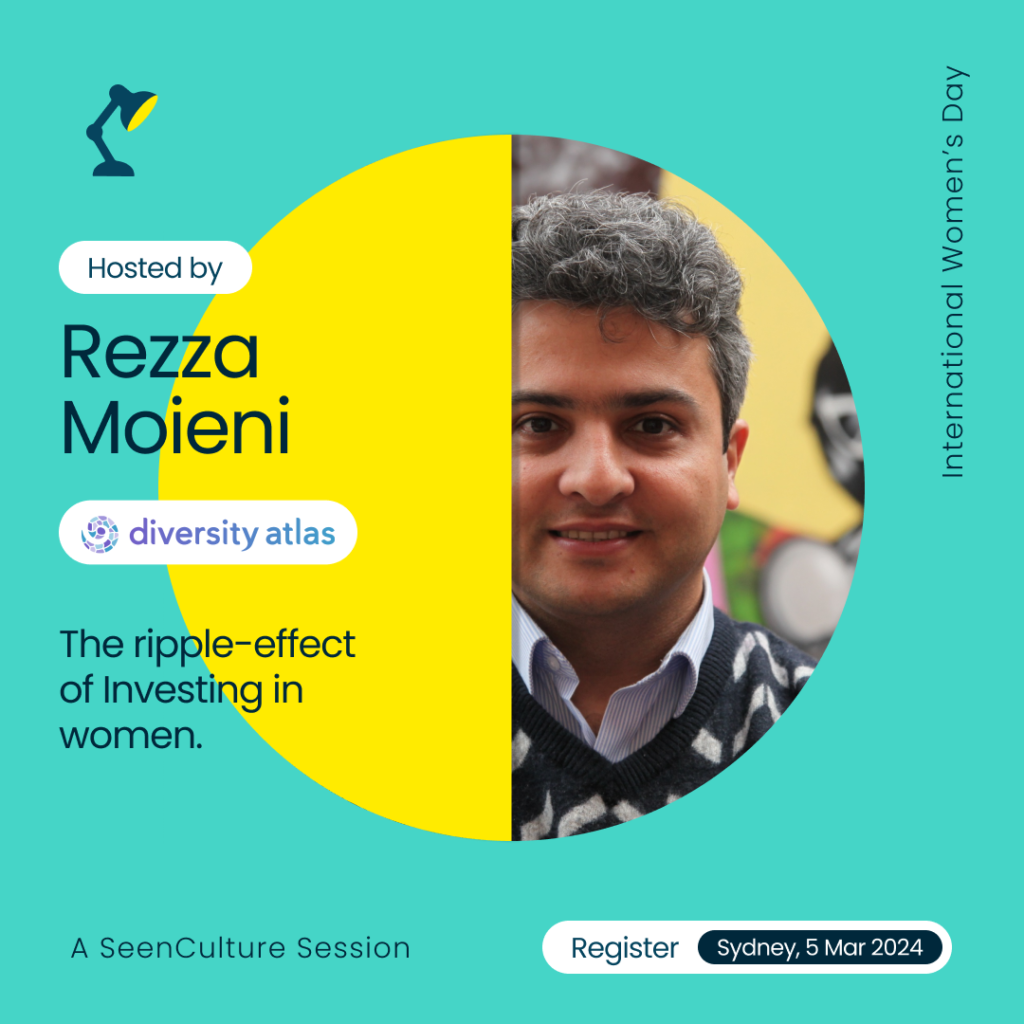![Featured image for “Diversity Atlas Newsletter [February 2024]”](https://diversityatlas.io/wp-content/uploads/2024/03/iStock-470149022.jpg)
Welcome to our February newsletter! As we dive into the latest developments and happenings within our community, we’re thrilled to share some exciting updates. This month, we’ve rolled out some new features on our platform around a new language and survey question. Additionally, our team has been actively engaged with international speaking events such as Tech Show London, as well as locally at WORKTECH Melbourne and SeenCulture’s International Women’s Day in Melbourne. We’re also delighted to announce the launch of Diversity Atlas’s webinar series, a valuable resource aimed at fostering inclusion and diversity in the workplace. Join us as we explore these highlights and more in this month’s edition!
Big Data & AI World 2024

Our CEO & Founder Peter Mousaferiadis will be speaking at Big Data & AI World UK 2024, as part of the highly anticipated Tech Show London in less than 2 weeks! In his keynote presentation, Peter will address one of the most pressing issues of our time: cultural identity in an era of technological advancement. In a world that’s increasingly interconnected and diverse, understanding cultural nuances has never been more crucial. Discover how embracing diversity can catalyse innovation and open up new possibilities at the intersection of AI and humanity.
Peter will also be chairing an interactive panel session that discusses the challenges faced by marginalised groups in the tech industry. Join us for a dynamic conversation with esteemed panelists who will share their personal journeys and insights on overcoming barriers to inclusion. From dismantling systemic biases to fostering truly inclusive work environments, this session aims to inspire change and empower everyone to contribute to a more diverse and equitable tech landscape.
Don’t miss out on these thought-provoking discussions at Tech Show London. Reserve your spot today and be part of the conversation shaping the future of technology and diversity.
Hack the secrets of inclusive events management!
The first of our Diversity Atlas’s webinar series is now open for registrations!
Join our Cultural Ambassador Mario Chatzidamianos (He/Him), in a conversation with Chisom Udeze (She/Her), Founder, Economist & DEIBJ Strategist, organiser of the Diversify Nordics Summit and Jen Murray (She/Her), Marketing Consultant at the TechDiversity Awards at our first webinar for 2024 on how to:
“Turn your events into Real Time Cultural Diversity Experiences”, and
- Identify the importance of celebrating cultural diversity among participants.
- Identify the importance of asking ‘who is missing?’
- Learn about the various attributes affecting cultural diversity self-id.
- Discover Diversity Atlas’s inclusive datasets, establishing global standards on data capture.
- Disseminate your events to relatable audiences.
- Create event marketing strategies that reflect your audiences’ cultural diversity.
Thursday 29 February, 2024, at 12:00 CET – 11:00 UTC
Scan the QR code below or fill in our participation form and save your spot today! Can’t join us live? Fill in the form and receive access to the on-demand video. For more information and media inquiries contact Mario.
Now in Arabic!

Our Diversity Atlas survey now comes in a 14th language – Arabic. This is from somewhat popular demand by our customers, not just in predominantly Arabic-speaking countries, but also in countries where Arabic speakers are in some quantity, including our home state of Victoria, Australia. According to the 2021 census, Arabic is the 6th most common language spoken in Victoria, and according to the UN it is the fifth most common spoken language on our big planet Earth.
There’s approximately 313 million native speakers of Arabic (though that word – ‘native’ – it’s not sitting quite right, we feel) and if we include Arabic proficiency as a second or third (or more) language, there’s around 422 million speakers. So it was essential for our global product.
One of the challenges we had from a development perspective is that the other 13 languages in which we offer the survey, read left-to-right, like English. Arabic is right-to-left (RTL) and so our dev and designer teams had to spend a lot of time creating the parameters within the software to make it not just read correctly, but also to look like it belonged on the pages. But now they’ve done that, it opens up the door for more RTL languages like Hebrew, Persian and Urdu. Though not RTL, we do also have Turkish and Hindi in our sights for loading as soon as we can.
A New Question! (Disability)
Our survey contains 26 core / default questions (some of which can be turned off if requested), and one of them relates to Long-Term Conditions. We define these as any long-term conditions that affect interactions and can be disabilities, medical conditions or even just neutral identity markers. They include options such as ‘neurodiversity’, ‘mental illness’ and ‘medical condition’. When we first commercialised three years ago the question did indeed say ‘Disability’ but we quickly worked out that we were losing data, or jeopardising the accuracy of it. This was best exemplified by one anonymous feedback note we received explaining that the writer was neurodiverse but did not consider this to be a disability , therefore they did not select it. We quickly updated, changed the terminology, and now we’re capturing better numbers.

But the problem this created was that some clients need to specifically report on percentage of staff with disability, no matter how defined, and so the solution was simple; adding a question:
Do you live with disability?
- Yes
- No
- Prefer not to answer
This blunt query will not just enable that reporting of ‘percentage’, but will also give us a good insight into what conditions were not subsequently considered disability. For example, 120 participants selected neurodiversity alone as a long-term condition, but only 40 of those said ‘yes’ to living with disability. Or 800 staff selected something from the long-term conditions drop-down, but only 600 selected yes to living with disability.
We are all about turning data into stories, and the best stories are complete ones.
Find out more about our survey here
The Future of Work and the Workplace

Diversity Atlas CXO Michael Walmsley will be speaking at WORKTECH Melbourne — the original workplace conference on Tuesday 26 March 2024.
Join him and other distinguished speakers as they explore topics on future technologies, cutting-edge, award-winning workplaces, people, change, and engagement. Explore the significance of grasping cultural nuances and uncover how this awareness can alleviate conflicts and enhance innovation.
In addition, don’t forget to take part in the Diversity Atlas survey as part of the event, where we will collectively embark on the journey of understanding and celebrating ‘Who we are’.
Add the code WT24-MEL-VIP to claim 20% discount on your ticket.
Celebrating International Women’s Day
CTO & Project Director Rezza Moieni will be speaking and hosting this year’s International Women’s event organised by SeenCulture, a software solution that uses AI to improve morale.
The event will explore the untapped potential of women, shedding light on the importance of recognising and valuing their contributions. Through engaging dialogue, we’ll uncover the transformative benefits of investing in women, addressing it as both a moral imperative and a catalyst for broad-based prosperity.
Enter free code: UNTAPPED POTENTIAL and RSVP today!

February Calendar Highlight

Share this Post